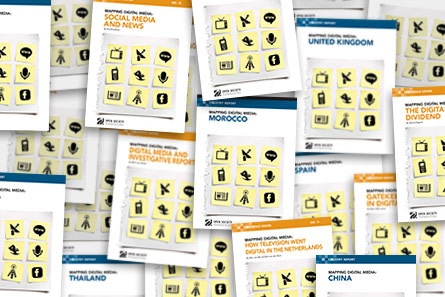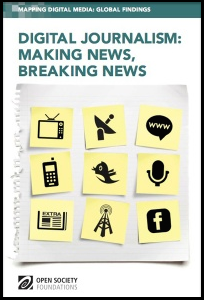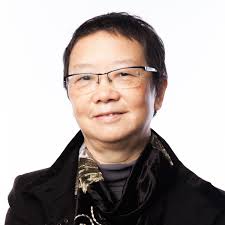

The Digital Switch: Citizen Journalism, Minority Coverage
 Editor’s Note: GIJN is pleased to present the last of a three-part series excerpted from Digital Journalism: Making News, Breaking News, a new report by the Open Society Foundation’s Independent Journalism and Information programs. The report summarizes the findings of OSF’s Mapping Digital Media project, the most extensive investigation of today’s media landscapes by any non-governmental organization, with more than 50 country reports since 2011. Its findings on the impact of digitization on media freedom and access to quality news are essential reading. The excerpt below continues Ying Chan’s chapter, Journalism and Digital Times: Wider Reach and Sloppy Reporting.
Editor’s Note: GIJN is pleased to present the last of a three-part series excerpted from Digital Journalism: Making News, Breaking News, a new report by the Open Society Foundation’s Independent Journalism and Information programs. The report summarizes the findings of OSF’s Mapping Digital Media project, the most extensive investigation of today’s media landscapes by any non-governmental organization, with more than 50 country reports since 2011. Its findings on the impact of digitization on media freedom and access to quality news are essential reading. The excerpt below continues Ying Chan’s chapter, Journalism and Digital Times: Wider Reach and Sloppy Reporting.
Citizen Journalism and Free Content
Citizen reporters have played a notable role in journalism in developed countries such as France and the United States, and emerging markets such as China, India, Jordan, Estonia, and Nicaragua. Citizen reporters are using the internet, video, mobiles, and other digital tools to gather information, interview people, watch events, seek comments from experts, and publish their stories via blogs, videos, Wikipedia, and other platforms. Facebook, Twitter, microblogs, and other social media help citizen reporters disseminate their work. Social media have facilitated citizen journalism in news production, distribution, and consumption.
Citizen reporters also help monitor traditional news media, correcting errors and contributing to news coverage. In Egypt, the rapid spread of news on the internet and the lack of information verification make citizen reporters effective supervisory bodies that can identify inaccuracies or bias in the news coverage:
With readers becoming more interactive and watchful, mistakes and flaws are easier to uncover. The resulting increased public scrutiny has pushed media outlets to perform better. Citizen reporters also upload images, videos or files to the internet, waiting for professional reporters to use for their investigative reporting. But on the other hand, online activism and citizen reporting have also improved readers’ tolerance towards inaccurate news. (For more, see MDM:Egypt)
In Germany, blogs have had an impact on journalistic investigations as a source of inspiration for citizen journalists as well as becoming a means to identify the most covered topics and monitor reactions to such reports. The blog that contributes most to journalism, in the view of German editors-in-chief, is the media-watch blog Bildblog.de.
In many countries, civil groups conduct independent investigations, tackle important policy issues, and become valuable alternative sources of information. Yet independent investigators or bloggers often face prosecution, intimidation, or threats from special interest groups. The effectiveness and impartiality of their work have also been questioned. For instance, in Malaysia, one renowned blogger, RPK, who became known for many exposés of the government and political parties, had published official- looking documents to lend credibility to his articles. He was detained without trial and charged by the government with criminal defamation. He exiled himself to London and then returned to Malaysia, sparking criticism that he had sold out to the Barisan National (BN) government. Even in China, where the party-state has maintained strict control over the news media, there has been an increase in the number of “citizen journalists, non-professional journalists who use the internet, video, mobile phones, and other digital tools to gather information, interview people affected by events, and seek out specialists’ opinions.” There are still countries where citizen journalism is in its infancy. In Japan, it has not taken root; several organizations set up in the early 2000s had limited success.
For example, JANJAN was established in 2003 and OhmyNews Japan in 2006. Both aimed to host reports and comments from ordinary citizens on events and issues relevant to their lives and communities. However, page views on OhmyNews Japan fell from 200,000 a day in 2006 to 70,000 just a year later.
The role of social media in news consumption is notable in China where there have been several major cases of news stories or packages, such as the 2008 Sichuan earthquake, being disseminated via blogs and microblogs. The 7.8-magnitude earthquake was first covered by Twitter-like microblogs, instant messages, and forum websites such as QQ.com and Tianya.com. News about the earthquake quickly spread across the world way ahead of traditional mainstream media. Also, microblogs have become a formidable tool for grassroots reporting and social or political activism in China. Twitter and domestic microblogs often distribute information not reported by traditional media, creating an alternative network of news challenging established media. Educated citizens, especially journalists and academics, regularly use proxy servers to access blocked sites, in defiance of government policy:
Microbloggers break news; they link a vast network of educated Chinese in real time to the events and issues of the moment; they expose wrongdoing and corruption; and they campaign for the victims of arbitrary power, sometimes in person. In doing so, their reports remain beyond the reach of editor-censors as they are forwarded instantly across cyberspace. Digital media have helped reporters and citizens alike to realize a more authentic China, rather than the idealistic image that is propagated by official media sources. These trends bring with them the promise of further development of an independent and vibrant Chinese civil society. (For more, see MDM:China)
User-generated content (UGC) websites have achieved massive popularity in a considerable number of countries. Of the top 10 most popular visited sites in Malaysia, five are UGC sites, that is, Facebook, Wikimedia, WordPress, Mudah.my, and 4shared. com. The local site Mudah.my is similar to eBay, and 4shared.com is a file-sharing site. These UGC platforms are also increasingly used by politicians and companies in their attempt to connect with ordinary Malaysians. For example, the prime minister, Najib Razak, has his own website, blog, Twitter account, Facebook site, YouTube page, and Flickr photo site. Many established traditional media in Malaysia have also expanded their presence online, establishing their presence on UGC sites. National newspapers including The Star have set up Facebook and Twitter accounts.
In the United States, by contrast, UGC is not well received by news organizations:
News employers and platforms pay little to nothing for UGC, which often has high traffic potential. The local news institutions and newspapers most under threat from the collapse of traditional journalistic business models have been the least likely to embrace pioneering forms of networked, collaborative reporting. Research suggests that while many online news sources are embracing the notion of participatory journalism, they do so with some reluctance, and certainly not to the full extent that technology allows. That said, new platforms such as The Huffington Post and Townhall.com have achieved considerable reach for more progressive writers and for conservative writers and comment-makers. (For more, see MDM:United States)
In Germany, although the relationship between professional and participatory media is widely discussed and researched, little evidence has emerged that blogs and other forms of participatory media are replacing traditional journalism. The types of UGC provided on popular websites include comments on news articles, message and discussion boards, social networking, and photo/music/video/ document sharing. “While the potential offered by the internet to establish a genuine two-way conversation between producers and users still seems to be at an experimental stage, most journalists have understood that they can no longer assume an attitude of passivity on the part of their audience. Over 50 percent of the journalists stated that social media have a high or very high relevance for journalistic work.” Professional journalists’ attitudes toward UGC vary from country to country. Journalists in Japan are not much influenced by opinions posted on the internet, with under 10 percent of journalists feeling “a little influence” on their reporting from the internet. Less than 15 percent expressed worries about being targeted by critics for their stories on the web, while more than half (51.1 percent) say they felt no such concern.
Social, Cultural, and Political Diversity
The most recurrent sensitive issues covered in the media include religious groups, ethnic minorities, women, child labor, domestic violence victims, migrants, and sexual minorities. The emergence of digital media has given a voice to minority groups and has helped expand the coverage of certain problematic issues. However, digital media have not changed the restricted, biased, or sensational coverage of such issues by traditional media.

Boy in eastern Balochistan, Pakistan, home to a mosaic of ethnic groups. Creative Commons photo c/o Ahsan, Flickr.
In Brazil, freedom of expression, sexual minorities, privacy and copyright, abortion, and racial and ethnic issues are all sensitive topics. The groups affected either do not have much space to express themselves on traditional media or are victims of biased coverage. The internet has provided these communities with a technology that enables them to cogently express their concerns and to better assert their rights:
The Voz da Comunidade case is the emblematic example in Brazil of the changes brought about by digitization. As the Complexo do Alemão favela was being invaded by the police and the army in November 2010, Voz da Comunidade transcended its reach as a community newspaper through the use of Twitter, with constant updates of the invasion going out to a wider readership. The coverage provided by Voz da Comunidade was very different in tone from that of the major newspapers and television; it was a live account of the invasion created by actual members of the community. (For more, see MDM:Brazil)
In South Africa, digital media have improved and enlarged the space for debate on sensitive topics that have little exposure in the mainstream media. These include class frustrations, racial tensions, gender-based discrimination, and violence. There are South African blogs that cover minority sexualities, including links to other sites and gay communities. Other sites are personal blogs about living as a homosexual in South Africa. In Singapore, race, religion, sexual minorities, and bilateral relations with Malaysia and Indonesia all belong to the category of sensitive topics, according to the report. Stringent legal guidelines govern coverage of matters pertaining to race and religion. Coverage of the gay community reflects the official standpoint, and information on practices such as homosexuality, lesbianism, and incest is treated with the utmost caution to ensure that they are not promoted, justified, or glamorized. In neighboring countries, the mainstream media tend to follow very closely the official policy promoting friendship with other nations. But the online forums of these same media have taken a more defiant position, in particular in Malaysia where the media occasionally attack Singapore: “As with so many other areas, the online world in Singapore allows considerably more room for the expression of stronger and more controversial views than are tolerated in the offline world.” Similar difficulties over covering minority issues are found in Pakistan, where new media outlets have provided much greater coverage of marginalized groups than the state-owned channels of the pre-digitization era. But the coverage is neither even nor consistent: “Religious minorities, residents of Balochistan and other remote parts of Pakistan, and non-mainstream or little-known political actors have yet to find a voice on the broadcast media.”
Political parties in almost all the country reports use digital media to deliver their messages during election campaigns. A rare exception was Bosnia and Herzegovina where political parties have not yet fully adopted digital media in their communications. In Finland, “both incumbent parties and state authorities have made use of new digital channels to disseminate their messages, but in general they have not exploited opportunities to engage in dialog with citizens.” Small parties are generally not covered in the mainstream media, but they managed to find a platform to make their voices heard online. The Finnish government has increasingly used social media as part of its communication strategy, more as a one-way channel for disseminating government messages than as a means of engaging citizens in dialog. However, digital media have not played a significant role in bringing to life new political actors. In less than one-third of the countries, the rise of digital media has given minority political groups, activists, and independent candidates the opportunity to participate in politics, but they are generally ignored by the mainstream media. Pakistan, China, and Finland experienced the greatest emergence of new political actors. In Eastern European countries, such as Poland, there were no changes in political actors due to digitization. In France, on the other hand, digitization has not made it possible for smaller political candidates to bypass the gatekeeping role held by traditional media, because their more prominent counterparts make better use of the internet’s opportunities.
From blogs to Facebook pages to Twitter accounts to YouTube videos to online radio stations, many entities have managed to establish themselves and have a following, particularly among young people. With the introduction and popularity of blogs and social networking sites, Egyptian bloggers emerged as a leading authority in the Arab world on publishing political content and pioneering political activism through online means. Facebook and Twitter in particular have been very popular in Egypt, especially since the 25 January 2011 revolution. Many people joined Facebook looking for news about the revolution and subsequent political and social activism. (For more, see MDM:Egypt)
Digital media do not necessarily facilitate discussion or increase citizen interest in politics. In less than half of the MDM countries, digital media have raised public interest in politics. These include emerging economies such as Brazil, China, Thailand, Indonesia, Pakistan, Egypt, and Kenya and developed countries such as Canada, the United States, Germany, Finland, and Sweden. In China, digitization has increased public knowledge about those holding power and made engagement in political activism livelier. Before, Chinese people had overwhelmingly ignored the possibility of directly participating in elections and did not care about the results. However, nowadays information about candidates in provincial or national elections can be more easily found on the internet.

Citizen monitoring of the 2014 elections in Guinea Bissau. Credit:Creative Commons photo c/o One World UK.
Interest in politics in many Western countries has not grown massively because of digitization. In France, there is no evidence of obvious growth in online political engagement, which has remained rather stable, with some increases (such as during the 2007 and 2012 presidential elections) and decreases during the less politically interesting periods. Independent websites, blogs, and other digital media platforms have given minority political parties and civic groups more opportunity to monitor elections and political events. Nicaragua 2.0, the Autonomous Women’s Movement, and the Movement for Nicaragua organized a system to register irregularities with a civil society information center by phone and via the web. This system allowed videos and photographs to be uploaded to a website and published on social networks, making it possible to aggregate the irregularities and report them to a national election observer. It was hoped that the voters in the 2011 election would register as many multimedia grievances as possible. However, the government counterattacked by saturating all the available communication outlets, many of them under its control, with its own messages and ignoring all the irregularities reported by the voters: “The government made concerted efforts to hinder citizens from filming or photographing what occurred in the voting centers and to stop opposition party observers obtaining copies of official documents.”
Reprinted with permission from the Open Society Foundations. The full report can be found here. Note: OSF is a donor to the Global Investigative Journalism Network.  Ying Chan is founding director of the Journalism and Media Studies Centre at Hong Kong University. She spent 23 years as a journalist in New York City, reporting for the New York Daily News, NBC News, and Chinese-language dailies. Her honors include a Nieman Fellowship at Harvard University, a George Polk Award for journalistic excellence, and an International Press Freedom Award by the Committee to Protect Journalists.
Ying Chan is founding director of the Journalism and Media Studies Centre at Hong Kong University. She spent 23 years as a journalist in New York City, reporting for the New York Daily News, NBC News, and Chinese-language dailies. Her honors include a Nieman Fellowship at Harvard University, a George Polk Award for journalistic excellence, and an International Press Freedom Award by the Committee to Protect Journalists.










